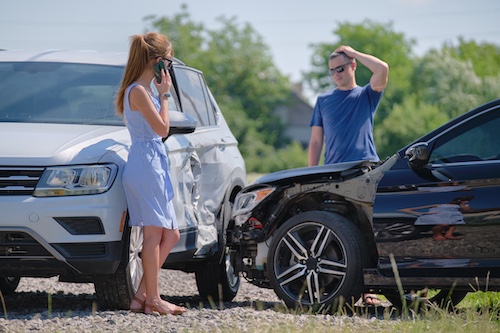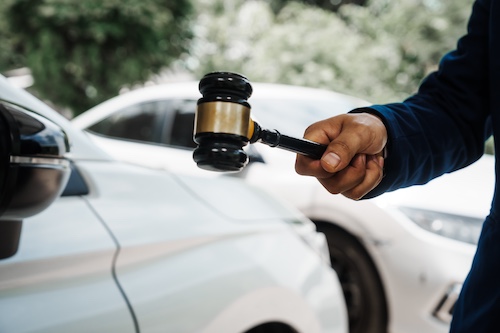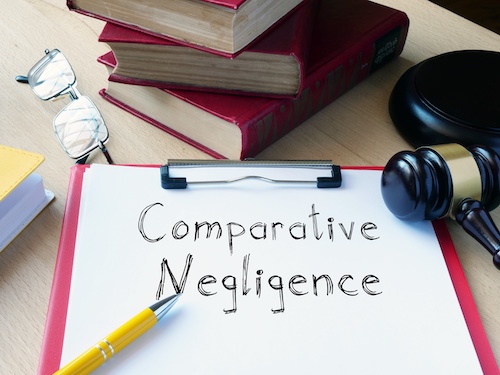Is North Carolina a No-Fault State Or a Fault State?
If you have been involved in a car accident in North Carolina, understanding how fault insurance works is essential. Unlike no-fault states, North Carolina follows a tort-based system, meaning the at-fault driver and their car insurance company are responsible for covering medical expenses, property damage, and other accident-related costs. This structure affects how insurance claims are handled, how compensation is recovered, and whether you may need a car accident attorney to protect your rights.
In this blog, we explain how North Carolina’s at-fault insurance system works, how fault is determined after a car crash, what no-fault coverage options are available, and why working with an experienced Charlotte car accident lawyer can help you protect your right to full compensation.
What Is a No-Fault State? | NC Car Accident Lawyers Explains North Carolina No-Fault Laws
Understanding what a no-fault state means is important for anyone reviewing their auto insurance policy or trying to seek compensation after a car accident.
No-Fault Insurance Basics for North Carolina Drivers
In a no-fault state, each driver’s own insurance company pays for their medical expenses, lost wages, and other accident-related costs after a car crash, no matter who caused the accident. This system relies on no-fault insurance laws, which often require drivers to carry personal injury protection (PIP) coverage as part of their auto insurance policy.
How the No-Fault System Works | NC Car Accident Lawyers Guide
Drivers in no-fault states typically file claims with their own insurer after an accident. This process helps injured drivers get medical care quickly, without waiting for fault to be determined. However, property damage is usually not covered by PIP and may still require proving fault.
Limits of No-Fault Insurance in North Carolina
The no-fault system can limit a driver’s ability to sue the at-fault driver unless their injuries meet a certain threshold. These thresholds vary by state and often include serious bodily injury, permanent disfigurement, or high medical costs.
No-Fault States vs. Fault States | Understanding North Carolina’s Fault-Based Insurance System
In fault states, like North Carolina, the driver who caused the accident is financially responsible. The injured party must prove the other driver was at fault to receive compensation. This system is known as fault auto insurance or the tort system.
Choice No-Fault Options and Insurance Flexibility | NC Car Accident Lawyers Insight
Some states allow choice no-fault insurance, giving drivers the option to use either no-fault or fault-based coverage. These states provide more flexibility but still follow specific state laws on how claims are handled.
North Carolina’s At-Fault Insurance System
North Carolina uses a fault-based insurance model, meaning the driver who caused the accident must pay for the damages.
Fault Insurance in North Carolina
North Carolina follows a tort system. After a car accident, the at-fault driver is responsible for covering bodily injury, property damage, and other accident-related expenses. Victims must file a claim with the at-fault driver’s car insurance company to seek compensation for medical costs, vehicle damage, and lost income.
Legal Requirement for Liability Coverage
Under N.C. Gen. Stat. § 20-279.21, drivers must carry minimum liability insurance to operate a vehicle. This includes:
- $30,000 for bodily injury per person
- $60,000 for bodily injury per accident
- $25,000 for property damage
This coverage pays for the injuries and losses suffered by the other party when the driver caused the car crash.
Insurance Claim Process
In an at-fault state, the injured party must prove that the other driver was responsible. Evidence such as a police report, medical records, and vehicle damage is used to support the claim. Once fault is determined, the car insurance company of the at-fault driver pays the damages.
No Personal Injury Protection (PIP) Mandate
North Carolina does not require personal injury protection. Instead, drivers may choose Medical Payments (MedPay) coverage to help with medical bills after an auto accident, regardless of fault. This is optional coverage and not the same as PIP in no-fault states.
Why Fault Matters
Because North Carolina is not a no-fault state, determining fault is critical. Drivers involved in an auto accident must understand their rights and obligations under the fault insurance system to seek compensation for injuries and damages.
How Fault Is Determined in North Carolina
Determining fault is a key step in the claims process after a car accident in North Carolina.
Evidence Used to Prove Fault
To prove fault, the insurance company and attorneys look at the police report, photos of vehicle damage, witness statements, and any available video footage. The actions of the drivers involved before and during the car crash are also reviewed. These details help identify the at-fault driver and support or challenge a car insurance claim.
The Role of Insurance Companies
Each car insurance company will conduct its own investigation to assign blame. Adjusters review medical records, accident scene evidence, and statements from both drivers. If both insurers agree on the fault determination, the injured party can move forward with a claim. If they disagree, a car accident attorney may need to step in to protect the injured person’s right to fair compensation.
North Carolina’s Contributory Negligence Rule
North Carolina follows the contributory negligence rule, which is strict compared to most at-fault states. If a driver is found to be even 1 percent at fault, they cannot recover any compensation. This rule is based on N.C. Gen. Stat. § 1-139. Insurance companies may try to use this rule to deny claims, which is why many drivers work with an experienced personal injury attorney.
Why Legal Help Matters
Because of the contributory negligence standard, it is often necessary to have a car accident lawyer gather strong evidence and defend against blame. Without legal support, a person who is slightly at fault could lose the right to seek compensation for medical bills, property damage, and lost wages.
No-Fault Insurance in North Carolina: Is There Any?
While North Carolina is not a no-fault state, some drivers may still have access to limited no-fault-style coverage.
No-Fault System Not Used in North Carolina
North Carolina does not follow the no-fault insurance system. Instead, it uses a fault-based liability system, where the at-fault driver is responsible for damages. There is no legal requirement for personal injury protection (PIP) coverage, which is common in no-fault states.
MedPay Offers Limited First-Party Coverage
Drivers in North Carolina can choose to add Medical Payments (MedPay) to their auto insurance policy. This optional coverage pays for medical expenses for the policyholder and passengers after a car accident, no matter who caused the crash. MedPay does not cover lost income, pain and suffering, or essential services, which are often included in PIP coverage in no-fault states.
How MedPay Works
MedPay covers short-term medical bills, such as emergency care, ambulance transport, and follow-up visits. It can also help cover deductibles and copays. However, coverage amounts are usually limited, and MedPay does not replace a claim against the other driver for serious auto accident injuries or long-term medical costs.
Key Differences from No-Fault Insurance
Unlike drivers in no-fault states, North Carolina drivers must still determine fault to recover full compensation. MedPay provides support for minor costs but does not change the legal requirement to prove the other party was at fault to recover for bodily injury, vehicle damage, and lost wages.
Frequently Asked Questions About No-Fault insurance
Can I Use Health Insurance To Cover Injuries If I’m Uninsured In An Accident?
Emergency Care Under Federal Law
Hospitals in North Carolina must comply with the Emergency Medical Treatment and Active Labor Act (EMTALA). In any serious car crash or auto accident, emergency departments will provide stabilizing treatment without regard to your ability to pay. This includes life-threatening injuries from a fatal accident or severe trauma.
Alternative Payment Options
Once you’re stabilized, you can explore:
- Payment plans or charity care programs at the hospital
- Applying for Medicaid (which may offer retroactive coverage) or Medicare if you qualify
- Filing for workers compensation if the injury occurred on the job and your employer carries coverage
North Carolina Is a Fault State, Not a No-Fault State
North Carolina is not a no-fault state. Liability for medical bills rests with the at-fault driver’s automobile insurance. If you carried uninsured motorist coverage, you can file a claim with your own insurer. Otherwise, you can pursue compensatory damages by filing a lawsuit against the negligent party. Our personal injury attorneys will:
- Gather evidence such as police and NCDOT reports, surveillance footage, and eyewitness testimony
- Retain expert witnesses to establish liability and damages
- Address contributory negligence defenses that North Carolina’s fault-state laws permit
How a Car Accident Lawyer Can Help
A dedicated car accident lawyer will:
- Review your auto accident file, including employer records and medical reports
- Negotiate with insurance adjusters to maximize your recovery
- Advise on whether to pursue a claim for workers compensation or a third-party lawsuit
- Ensure all evidence—from witness testimony to surveillance footage—is properly documented
No health insurance means you’ll rely on these alternatives. An experienced NC car accident lawyer guides you through fault-state rules, protecting your right to fair compensation under North Carolina law.
Why Is Establishing Liability Necessary In A North Carolina Car Accident Case?
Fault and Legal Recovery
North Carolina is a fault state—not a no-fault state—operating under strict contributory negligence. That means if you bear even 1% fault, you cannot recover from the other driver. Only a completely innocent party may seek damages.
Impact on Insurance Coverage
• Liability determines which automobile insurance policy responds:
– At-fault driver’s liability insurance typically covers medical expenses, property damage, and lost wages.
– Beginning July 1, 2025, minimum liability limits will rise to $50,000 per person, $100,000 per accident for bodily injury, and $50,000 for property damage.
• If liability is not established, you must rely on your own uninsured/underinsured motorist coverage, which may be optional for underinsured protection.
Proving Liability
To build a compelling case, we gather:
• Eyewitness testimony and witness statements
• Police reports and NCDOT crash data
• Surveillance footage and crash-scene photos
• Medical records and expert witness analysis
This evidence demonstrates negligence (failure to act with reasonable care) and causation (direct link to your injuries).
Why It Matters
• Contributory negligence bars any recovery if you share fault—unique in NC fault laws versus a no-fault state.
• Proper liability proof unlocks full compensation for injuries, property damage, and other losses.
• Without liability, victims face uncovered medical bills, lost wages, and repair costs.
Next Steps
Consult seasoned personal injury attorneys who specialize in NC auto accident cases. Our dedicated car accident lawyers help you:
• Identify and preserve critical evidence
• Navigate NC fault vs. no-fault insurance rules
• Negotiate with insurers to secure maximum compensation
By establishing liability, you protect your rights and position yourself for the fullest possible recovery under North Carolina law.
What Is Contributory Negligence In North Carolina Car Accident Cases?
Definition of Contributory Negligence
In North Carolina—a fault state, not a no-fault state—contributory negligence is a strict legal doctrine. If you are found even 1% at fault for your injuries in an auto accident, you are barred from recovery. Courts apply a “reasonable person” standard: any lapse in ordinary care that contributes to the crash prevents you from obtaining compensation from the other driver.
Contrast with No-Fault and Comparative Systems
• Unlike a no-fault state where each party looks to their own automobile insurance, NC follows a pure contributory negligence rule.
• In most comparative negligence jurisdictions, fault is apportioned and damages are reduced accordingly; in NC, even the slightest shared fault means no recovery.
Limited Exceptions
Although rare, recovery may be allowed if the defendant’s actions are willful or grossly negligent, such as:
- Drunk driving or intentional misconduct
- Extreme recklessness causing a fatal accident
Critical Role of Evidence
Proving zero fault requires a robust evidentiary record. Key elements often include:
- Police and NCDOT crash reports
- Eyewitness testimony and witness statements
- Surveillance footage or third-party video
- Expert witnesses on vehicle dynamics and roadway conditions
- Maintenance and employer records when commercial vehicles are involved
How Our Car Accident Lawyer Team Helps
Our personal injury attorneys focus on delivering client-centered representation:
- Thorough investigation of every contributory negligence claim
- Aggressive negotiation with insurers who cite NC fault laws to deny claims
- Strategic use of surveillance evidence, expert testimony, and medical documentation
- “No Fee Unless We Win” promise ensures you pay nothing unless we secure compensation
If you’ve been injured in a North Carolina car crash, it’s critical to partner with skilled car accident lawyers who understand how to overcome the state’s harsh contributory negligence barrier. Contact us for a free consultation.
Talk to an Experienced Charlotte Car Accident Lawyer Today | NC Car Accident Lawyers
If you’ve been involved in a car accident in Charlotte, North Carolina, you don’t have to face the aftermath alone. The legal team at NC Car Accident Lawyers, a trusted North Carolina car accident law firm, is ready to help you take action.
Our Charlotte car accident lawyers handle every step of your case — from investigating the crash and collecting vital evidence to negotiating with insurance companies for maximum compensation. Whether you’re dealing with medical expenses, lost wages, or vehicle damage, we’re here 24/7 to protect your rights under North Carolina car accident laws.
Contact us today for a free consultation and speak directly with a Charlotte car accident lawyer who will fight for the justice and compensation you deserve 864-561-6247







